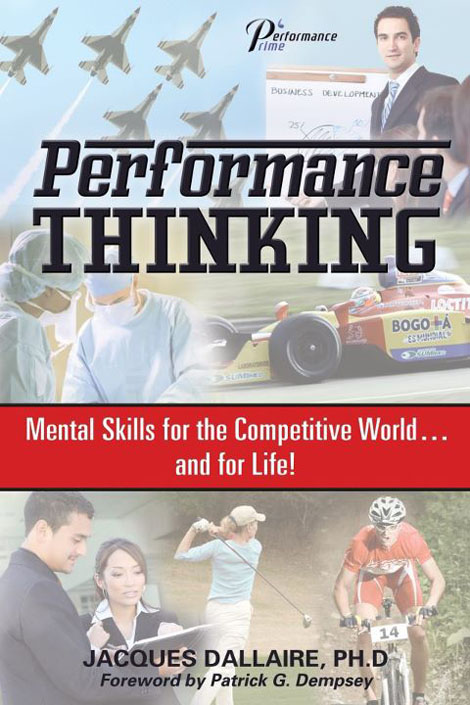Aug
23rd
Stay connected Subscribe to our RSS feed
A new book, titled Performance Thinking, written by Jacques Dallaire, Ph.D., has been released recently and it explains how to develop mental skills for the competitive world, sports (including motorsport) and for life.
Interestingly, Dr. Dallaire was one of my teachers at McGill University in the '80s. In fact, I introduced Jacques to the world of motorsport, and from that interest he and other researchers created the “McGill Motorsport Research Group” destined to help race car drivers with their physical and mental preparation -- a unique feat back then.
Over the years, Dr. Dallaire has worked closely with several famous and successful race car drivers, such as Indy 500 winners Rick Mears, Emerson Fittipaldi and Helio Castroneves, as well as Formula 1 World Champions Ayrton Senna and Nigel Mansell.
In his book, Dr. Dallaire explains how our way of thinking has a direct influence on our performance -- in sports, in real life and at work. Throughout the 238 pages, Dr. Dallaire provides clear, simple examples to illustrates his theories. However, I strongly suggest that you read just a chapter at a time, then sleep on it, as there's a lot of crucial information to absorb.
The main objective of the book is to try to answer a fundamental and universal question: How do I mentally sabotage my own performance, and how can I learn not to?
So, Dr. Dallaire explain that individuals have first to learn the difference between their performance and the final outcome of the competition. The concept is to focus on our own performance without worrying about things we have absolutely no control over.
Since the mind can only actively process one thought at a time, it's better make it a positive one. In the case of a race car driver, that would be to think about the correct racing line through a corner rather that what's going to happen if I crash the car there?
OK, so how do I change my way of thinking?
In the last section of his book, Dr. Dallaire explains his A.C.T. model process (A game, Compare, Transfrom) that represents three key steps that are used in mental reconditioning.
An excellent book not only meant for motorsport champions, but for anyone who wants to perform better and more efficiently in their everyday lives.
Edited by Dallaire Consulting.
www.performanceprime.com
 |
| Dr. Jacques Dallaire |
Interestingly, Dr. Dallaire was one of my teachers at McGill University in the '80s. In fact, I introduced Jacques to the world of motorsport, and from that interest he and other researchers created the “McGill Motorsport Research Group” destined to help race car drivers with their physical and mental preparation -- a unique feat back then.
Over the years, Dr. Dallaire has worked closely with several famous and successful race car drivers, such as Indy 500 winners Rick Mears, Emerson Fittipaldi and Helio Castroneves, as well as Formula 1 World Champions Ayrton Senna and Nigel Mansell.
 |
| Dr Dallaire started helping Nigel Mansell when he began his F1 career at Lotus. (Photo: WRI2) |
In his book, Dr. Dallaire explains how our way of thinking has a direct influence on our performance -- in sports, in real life and at work. Throughout the 238 pages, Dr. Dallaire provides clear, simple examples to illustrates his theories. However, I strongly suggest that you read just a chapter at a time, then sleep on it, as there's a lot of crucial information to absorb.
The main objective of the book is to try to answer a fundamental and universal question: How do I mentally sabotage my own performance, and how can I learn not to?
So, Dr. Dallaire explain that individuals have first to learn the difference between their performance and the final outcome of the competition. The concept is to focus on our own performance without worrying about things we have absolutely no control over.
 |
Since the mind can only actively process one thought at a time, it's better make it a positive one. In the case of a race car driver, that would be to think about the correct racing line through a corner rather that what's going to happen if I crash the car there?
OK, so how do I change my way of thinking?
In the last section of his book, Dr. Dallaire explains his A.C.T. model process (A game, Compare, Transfrom) that represents three key steps that are used in mental reconditioning.
An excellent book not only meant for motorsport champions, but for anyone who wants to perform better and more efficiently in their everyday lives.
Edited by Dallaire Consulting.
www.performanceprime.com
 The latest auto news, reviews, prices, product and vehicle releases.
The latest auto news, reviews, prices, product and vehicle releases.